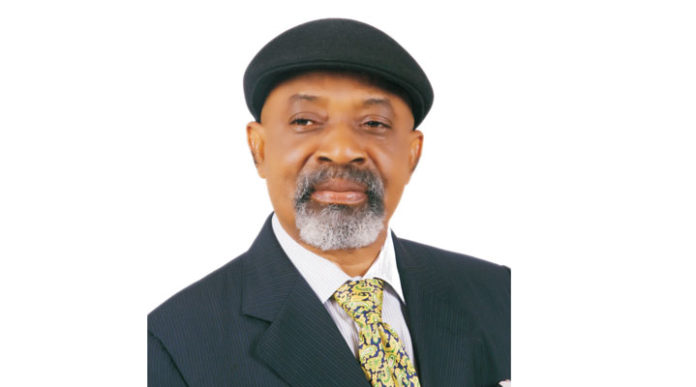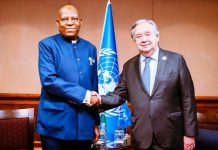ABUJA – (Labour Ministry Report ) – The attention of the Minister of Labour and Employment, Chris Ngige has been drawn to the various misrepresentations being given to the Press Briefing on the New National Minimum Wage delivered at the Aso Villa, Abuja on Tuesday 22nd of January 2019 after the meeting of the National Council of State.
The release from the Publicity Department of the Labour Ministry, recently on the situation indictates that for the avoidance of doubt, the Minister wishes to clarify as follows:
“A National Minimum Wage is the minimum amount of remuneration that an employer is required to pay wage earners (workers) at the lowest rung of the salary scale for the work performed during a given period,” he stated.
“At the expiration of the last National Minimum Wage (Amendment) Act, which was enacted in 2011, Mr. President constituted and inaugurated a Tripartite Committee on National Minimum Wage (TCNMW) in November 2017 to consider the issue and recommend a new National Minimum Wage to the Government.”
He stated that the constitution of the Tripartite Committee was in consonance with the provisions of the International Labour Organisation (ILO) Convention Nos. 26, 99, and 131 as well as the guidance provided by the accompanying recommendations. According to the Minister, in a bid to achieve a holistic and democratic coverage, the prescribed tripartite structure went beyond the requirements of tripartism (the Government and Social Partners) to extend to Tripartite – Plus, in order to cover other stakeholders. The stakeholders, he mentioned included: the Nigeria Association of Chamber of Commerce, Industry, Mines and Agriculture (NACCIMA); Manufacturers’ Association of Nigeria (MAN) and the National Association of Small and Medium Enterprises (NASME); in addition to the recognised employers’ Federation – the Nigeria Employers’ Consultative Association (NECA).
Chris Ngige further noted with importance that the constituted TCNMW was mandated by Mr. President to deliberate on the issue of a review of the National Minimum Wage and make recommendations for its upward review. Adding, the output from the TCNMW was therefore never meant to be sacrosanct, but to provide a guide for the Competent Authority (Government) to take a final decision. In his explanation, the ILO Conventions on Minimum Wage cited above succinctly stipulated that each Member State shall be free to decide the nature and form of the Minimum Wage Fixing Machinery and methods to be followed in its operation.
He later inferred from the Convention provisions that before the Competent Authority takes the final decision on a National Minimum Wage, there should be full preliminary consultations with the most representative organizations of employers and workers, saying this was done when Mr. President constituted and encouraged the work of the TCNMW.
The Labour Minister stressed that the Report of the TCNMW asked Mr. President to note the figure of Thirty Thousand Naira (N30, 000.00) recommended by the TCNMW by way of motion and not by consensus, and also to note the Federal Government’s figure of Twenty Four Thousand Naira (N24, 000.00). He continued that Mr. President considered the Report in full and looked at the differing statistics, provisions and figures presented by everybody before arriving at the figure of Twenty – Seven Thousand Naira (N27, 000.00) per month and reiterated that the output by the TCNMW was a recommendation that was not cast in stone, but advisory to Mr. President.
In conformity with the provisions of the 1999 Constitution of the Federal Republic of Nigeria (as amended), the Minister revealed that three Constitutional Bodies further considered the figures stated below:
i. The Federal Executive Council – Section 146 – 147 of the 1999 Constitution of the Federal Republic of Nigeria (as amended).
ii. The National Economic Council – Section 153 and Third Schedule of same Constitution.
iii. The National Council of States – Section 153 and Third Schedule of same Constitution
“These are all advisers of Mr. President and he is required by the Constitution to take advice and consult these three Bodies on any Political, economic, Security and other sundry issues of the nation requiring Presidential Consultations and Advice. These bodies are therefore qualified to further consider the recommendations by the TCNMW and advise Mr. President on the best national position that would be equitable and fair to all stakeholders on the matter of a new National Minimum wage,” the Minister noted.
“IT IS NOT THE NATIONAL COUNCIL OF STATES ALONE THAT CONSIDERED THESE FIGURES AND THE NEW BILL. THE JOB OF THESE THREE BODIES TO MR. PRESIDENT ARE ADVISORY AND CONSULTATIVE IN NATURE ESPECIALLY THE NATIONAL COUNCIL OF STATE.”
The Labour Boss avowed that the recommended new National Minimum Wage of Twenty Seven Thousand Naira (N27, 000.00) is for ALL categories of workers in Nigeria, whether Public or Private Sector and is contained in the new National Minimum Wage Bill. He implied that the workers in the Public Sector are those working in the Federal, State, and Local Government tiers of Government, indicating that the National Minimum Wage is for workers occupying the lowest rung of the remuneration ladder on Grade Level 1 step 1, and are the most vulnerable segment of Nigerian workers.
“It is of utmost importance to note that any Public or Private Sector employer who is capable of paying more than the statutory Twenty Seven Thousand Naira (N27, 000.00) should be ready to do so, even without subjecting the concerned workers to a tortuous negotiation by the applicable negotiation councils. The Federal Government has taken the lead in this direction by proposing to augment the Twenty Seven Thousand Naira (N27, 000.00) National Minimum Wage of Federal workers by Three Thousand Naira (N3, 000.00) per month to bring it up to Thirty Thousand Naira (30,000.00) for the least paid worker per month,” he informed.
“The Federal Government accordingly, expects others in the Public and Private Sectors to do the same, and if the financial capacity permits, employers can pay more than Thirty Thousand Naira (N30, 000.00), especially where their workers are very productive and the Private Sector is a very profitable enterprise.”
While emphasising that the National Minimum Wage is in the Exclusive Legislative List as item No. 34 of the Second Schedule to the 1999 Constitution of the Federal Republic of Nigeria (as amended), he said it is therefore the Executive arm of Government that has the responsibility to prescribe a new National Minimum Wage and send it to the National Assembly (NASS) for legislative action, towards getting the Bill passed and or amended and reverting same to Mr. President for Assent like any other law of the nation.
It was his position to use this medium to ask the different groups who have interest, agreeing or disagreeing on the contents of the 2019 National Minimum Wage Bill already transmitted to NASS, to get ready to make their views known at the Public Hearing. The Minister expressed his well wishes to Nigerian workers and thanked NASS for expeditiously treating the Bill by letting it pass the first and second readings in one legislative day and also in setting up an urgent ad-hoc Committee to treat the matter in both Chambers very swiftly.






